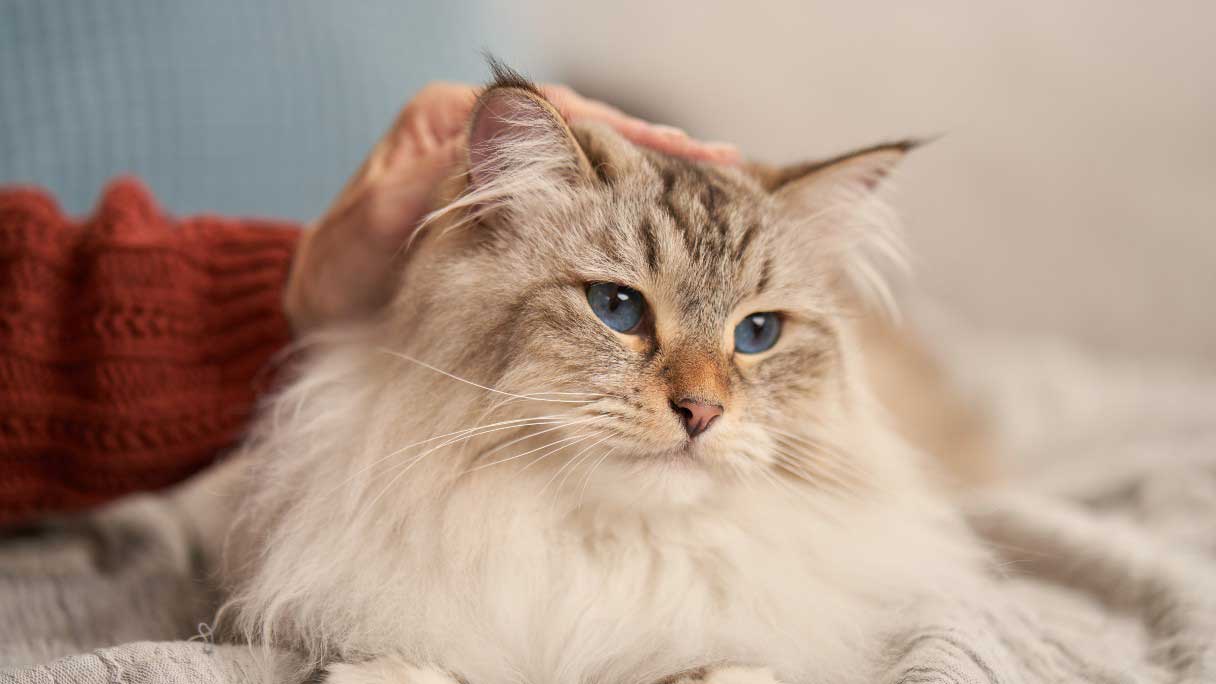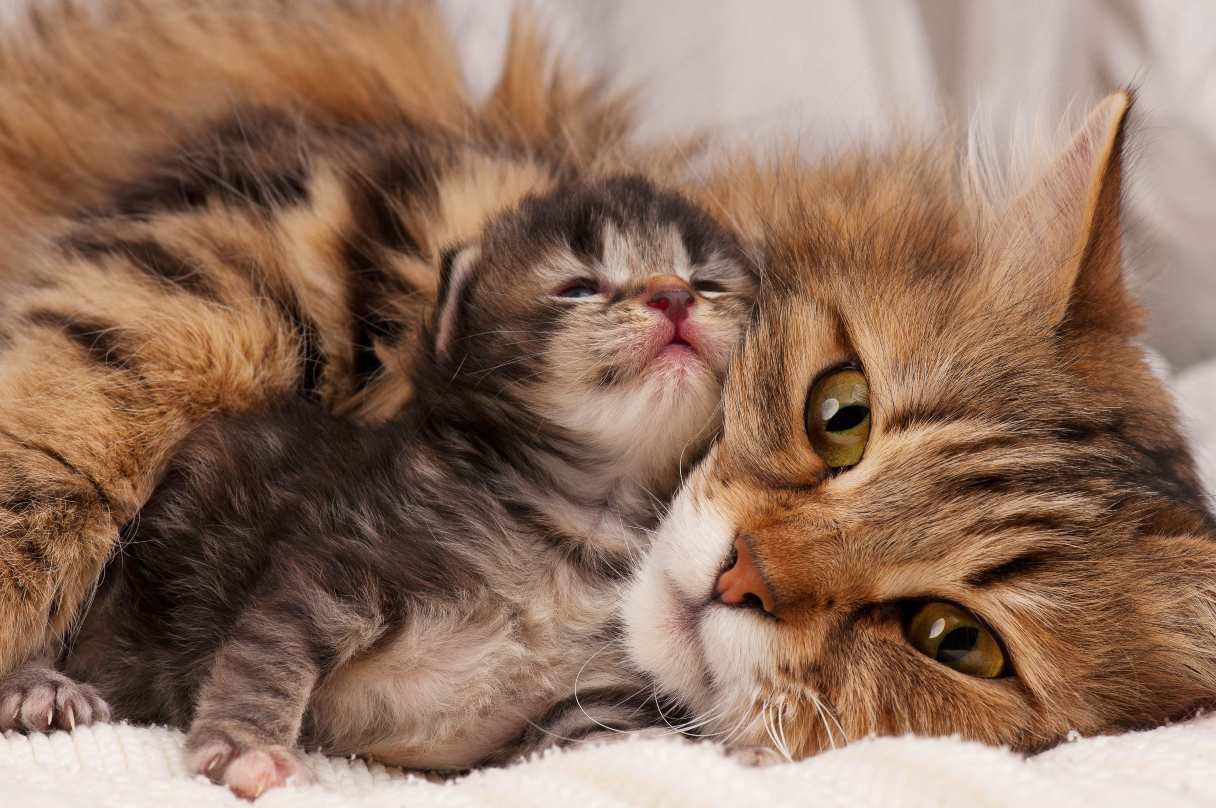You can learn a lot about your cat’s health by checking their stool. A mushy, soft or runny stool could simply be a sign of an upset stomach, but it could signal something more serious.
Understanding the causes of diarrhea in cats and kittens and knowing when to contact your veterinarian are important steps toward keeping your feline friend happy and healthy. Here are 18 reasons why your kitty might experience loose or runny stool.
1. Stress
Just as with people, stomach upset leading to diarrhea in both cats and kittens can be caused by stress and anxiety. Trauma, physical pain and lack of proper socialization can all lead to a stressed-out kitty.
Changes to your cat’s environment can also cause stress and trigger diarrhea. This could include moving to a new home or adding a new pet or a new person (or baby) to your home. But it could even be something as low-key as moving the furniture or trying out a new brand of cat litter.
2. Constipation
It might not make sense, but motility issues in a cat’s colon that cause stool obstructions can also cause liquid stools that occur in small amounts and make it past the obstruction to exit the body. This happens mainly with older cats.
3. Diet
Changes in your cat's diet, like switching to a new food, can cause gastrointestinal irritation that can in turn cause mild or temporary diarrhea. Cats can also get food poisoning from food that’s been contaminated with bacteria like salmonella or E. coli.
4. Ingesting Toxic Substances
Some cats will eat anything, and this is especially true for curious kittens. Many common household chemicals and both house and garden plants are toxic to cats and may cause diarrhea if ingested.
5. Drinking Cow’s Milk
It’s a common trope in popular culture to give cats a bowl of milk or cream, but the truth is that most cats are lactose intolerant. While some cats can digest dairy, imitating this practice in real life is often a ticket to cat diarrhea.
6. Food Allergies
Speaking of diet, cats can sometimes develop food allergies and intolerances that can upset their stomach and cause diarrhea. This occurs when they consume a substance that triggers their immune system to respond. The most common food allergens for cats are beef, fish, chicken and dairy. But cats who are fed carbohydrates could also develop allergies to wheat, or possibly to the gluten protein that it contains.
7. Infections
Both bacterial and viral infections can result in diarrhea in cats and kittens. Unvaccinated kittens are especially vulnerable to viruses like feline leukemia, panleukopenia, feline immunodeficiency virus and rotavirus.
8. Foreign Objects
Curious cats and kittens sometimes gobble up strings and other nonfood items. Swallowing a foreign object can cause stomach upset and even create an intestinal blockage that can cause diarrhea.
9. Eating Garbage or Spoiled Food
If your cat gets into the garbage, they might swallow food wrappers, paper, plastic or other items that can act as a foreign object on their intestinal tract. They might also eat spoiled and contaminated food that gives them food poisoning.
10. Bowel Obstructions
Besides eating foreign objects, bowel obstructions can also be caused by problems with the intestines or motility issues that cause constipation. Along with vomiting and pain, diarrhea is a common sign of bowel obstruction in cats.
11. Parasites
More common in kittens than in adult cats, internal parasites can irritate the intestinal lining and cause severe diarrhea. Some parasites that commonly affect cats include tapeworms, roundworms and giardia.
12. Inflammatory Disease
Diseases and disorders affecting the digestive tract, such as inflammatory bowel disease, can cause vitamin deficiencies and other nutritional problems that can lead to loose stool and diarrhea.
13. Medication Side Effects
Diarrhea is often a side effect of many prescription medications used to treat cats, including antibiotics and pain relievers. A common antibiotic like amoxicillin can also cause stomach upset, which may include diarrhea.
14. Pancreatitis
Pancreatitis occurs when the pancreas becomes inflamed. Diarrhea is one symptom of this illness, which can also cause nausea and vomiting, appetite loss, lethargy and abdominal pain. This is a potentially serious condition that can lead to death or have lasting health implications if it’s not treated.
15. Colorectal Cancer
Cancer that develops in the digestive tract can also produce diarrhea, in addition to other symptoms. The most common form of colorectal cancer in cats is intestinal lymphoma. This is a cancer affecting the lymphatic cells located in the intestines. Cats with this type of cancer might also show signs that include vomiting and weight loss.
16. Kidney Disease
The kidneys are responsible for filtering waste out of the blood supply. When they can’t keep up with the amount of waste, kidney disease develops, one sign of which is diarrhea. Other signs include weight loss, a poor coat and drinking excessive amounts of water.
17. Hyperthyroidism
Hyperthyroidism is a metabolic disease in which the thyroid produces too much thyroid hormone. This disease usually develops in older cats and can cause periodic diarrhea, as well as vomiting. Other signs include unexplained weight loss, changes in mood and behavior, increased thirst and a rough-looking coat.
18. Liver Disease
A healthy liver filters toxins from the body. When the liver can no longer do this properly, liver failure results, which can be another cause of diarrhea in cats. The most notable signs of liver failure are swelling of the abdomen and a yellowish appearance of the skin, eyes and mucous membranes, and signs also include lethargy, excessive thirst and urination, appetite changes, weight loss and vomiting, in addition to loose and runny stools.
What Your Cat's Stool Says About Their Health
Cat and kitten diarrhea can take on different appearances and textures, each of which tells a story about your kitty's health. This chart can help you know what's normal and when to see your vet.
Cat/kitten poop chart
| Type | What it means | What you should do |
|---|---|---|
| No stool/unproductive straining | Severe constipation | Keep an eye on your cat, and make sure they're getting enough water. If they go more than two or three days without passing stool, contact your vet. |
| Hard and pebble-like | Mild constipation | Try switching the type of protein you're feeding them, which might be easier on their stomach. Make sure they're getting plenty of exercise, and minimize their stress. Consider adding a probiotic supplement to improve gut health. |
| Smooth, slightly lumpy, shaped like a sausage | A healthy gut | No need to do anything different |
| Slightly mushy but holds its shape | Mild gastrointestinal (GI) irritation | Keep an eye on the situation. If it doesn't get better after a few days, gets worse or is accompanied by other signs of illness, contact your vet for advice. |
| Watery or soupy | Diarrhea | If you've got a young kitten, see a vet right away. If you've got an adult cat, wait a day to see if it gets better. If it doesn't, or if it's accompanied by other symptoms, see your vet. |
| Slimy mucus in the stool | Inflammation of the colon, i.e., food intolerance or inflammatory bowel disease | See your vet. |
| Red blood in stool | Giardia or inflammation of the colon, i.e., food intolerance, inflammatory bowel disease (IBD) | If there’s a lot of blood, see your vet right away. |
| Black/tarry stool | Bleeding in the GI tract | Treat this like an emergency and see a vet ASAP. |
| Orange stool | Possible indication of liver or gallbladder issues | See your vet. |
| Yellow stool | May be a sign of coccidia, a parasitic infection | See your vet. |
| Green stool | Possible bacterial infection | See your vet. |
How to Treat Cats With Diarrhea
At the first sign of diarrhea, you can take these steps to provide your kitty with some relief. For diarrhea that's temporary and mild, this may be all you need to do.
Home treatments
Diarrhea can sometimes be treated at home with simple remedies. Here are some to consider:
- Provide plenty of access to fresh water. Dehydration is the biggest danger from diarrhea, especially for young kittens. Encourage them to drink often, and if necessary, add water to their food.
- Consider whether any recent dietary changes may be causing indigestion. If so, go back to what you were feeding them before, and then gradually introduce new food by mixing it in with the old.
- Pay extra attention. Make sure you're not feeding your cat or kitten any dairy products or allowing them to eat table scraps.
- Add fiber to their diet to help firm up stool. Try feeding your kitty one teaspoon to one tablespoon of plain, pureed pumpkin. Pumpkin also contains the compound cucurbitacin, which is believed to have some benefit in treating intestinal parasites.
- Try to pinpoint and, if possible, eliminate or mitigate any sources of stress in your cat's life. Aside from diarrhea, other signs of stress in cats include excessive grooming, not using the litter box, hissing and aggression, hiding, increased vocalizations and decreased appetite. If the source of stress is unavoidable, cat pheromone diffusers or sprays might help relieve your kitty's anxiety and help them calm down enough for their digestion to return to normal. If you can’t identify the source of your kitty’s stress, you should talk to your vet about a possible underlying cause for their symptoms and ways to help your anxious cat.
Persistent and severe diarrhea will need to be properly diagnosed by a vet to determine the underlying cause and the correct course of treatment. Depending on the cause, here's what your vet may prescribe.
Veterinary treatments
More severe cases of diarrhea may require a trip to the vet, who can determine the cause. Your vet may prescribe or suggest the following:
- Prescription diet cat foods. Your vet may recommend switching your cat to a prescription diet that's easier to digest and high in fibers that feed the good bacteria in your kitty's gut. This could cost between $25 and $75, depending on the brand and type of food. Alternatively, if food allergies are suspected, your cat may be placed on an elimination diet to help determine what's triggering the allergic reaction. This type of cat food tends to run $30 and up for a small bag of dry kibble.
- Probiotics. Probiotics may also be prescribed and can be obtained over the counter for $15 to $20 and up.
- Dewormer. If parasites are detected, your vet will most likely treat your cat or kitten with an oral dewormer. One commonly used dewormer costs around $6 for 50 tablets.
- Antibiotics. Antibiotics might also be prescribed to treat possible infections. Metronidazole is an antibiotic commonly prescribed for infections and diarrhea in cats which, depending on the dosage, costs $5 to $10 for a 10-day supply.
You can also talk to your vet about adding pumpkin to your cat's food, which provides extra fiber that may help firm up their stool. Hypoallergenic diets for cats and kittens with food allergies may also be something to consider.
Regardless of the cause, your vet may prescribe a cat-safe antidiarrheal agent to slow or stop the diarrhea and provide your kitty with some relief. Although it might be tempting to give your cat antidiarrheal medication from your medicine cabinet, over-the-counter antidiarrheal made for humans contains ingredients that are not safe for cats. Severe cases of diarrhea, and diarrhea involving young kittens, may also require the delivery of intravenous or subcutaneous fluids to treat dehydration.
When Should I Take My Cat to the Vet for Diarrhea?
You should contact your vet if your cat's or kitten's diarrhea doesn't clear up in 24 to 48 hours or if you notice blood or discoloration in their stool. You should also see your vet immediately if the diarrhea is accompanied by any of the following symptoms:
- Appetite changes
- Behavioral changes
- Bloated abdomen
- Changes in coat quality
- Dry or tacky gums (a sign of dehydration)
- Excessive drinking or thirst
- Fever
- Foul-smelling stool
- Loss of energy
- Pain
- Panting
- Vomiting
- Weight loss
And keep in mind that it's always a good idea to contact your vet at any sign of health changes in your cat.
The Bottom Line
Diarrhea is a common occurrence with cats and kittens, and sometimes it’s not that big of a deal. But it can also be deadly serious. Knowing when to call a vet for help could make all the difference for your kitty. And when in doubt, it’s always best to check in with your vet.
CareCredit Credit Card Financing for Cats
Taking good care of your pet's well-being from nose to tail is essential. Make sure to stay up to date on their regular checkups at the vet to help keep your pet happy and healthy for a lifetime of love. You can use your CareCredit credit card for pet care throughout the year for routine veterinary services as well as emergencies and surgeries.* Use our Acceptance Locator to find a veterinarian near you that accepts CareCredit.
CareCredit is there for you and your pet every step of the way; continue your wellness journey by downloading the CareCredit Mobile App to manage your account, find a provider on the go and easily access the Well U blog for more great articles, podcasts and videos.
In addition to pet care, you can also use your CareCredit credit card for dentistry, cosmetic, vision, hearing, health systems, dermatology, pharmacy purchases, spa treatments and so much more within the CareCredit network. How will you invest in your health and wellness next?
Expert Reviewer
Dr. Kathy Wiederkehr (Wentworth), V.M.D.
Dr. Kathy Wiederkehr (Wentworth) has been practicing veterinary medicine at pet care facilities in California since 2001. Most recently, she served as medical director of the VCA PetPoint Medical Center and Resort in Irvine. She is a graduate of the University of Pennsylvania School of Veterinary Medicine and became board-certified as a diplomate in Canine and Feline Practice by the American Board of Veterinary Practitioners in 2010.
Author Bio
Jean Marie Bauhaus is a freelance writer and novelist who has been writing pet content since 2013. Her work has appeared on Forbes.com, Hill's Pet, Chewy, AKC.org and more.








